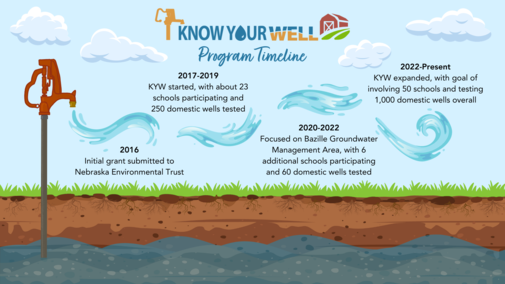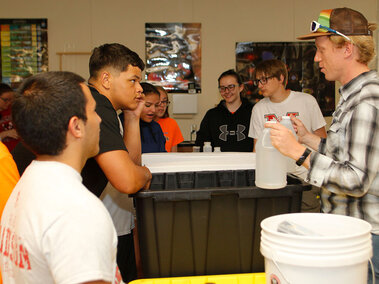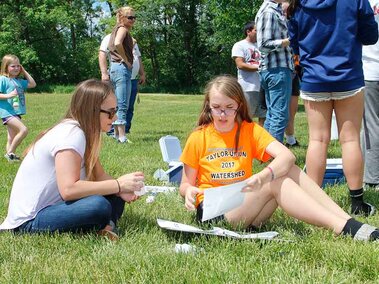Know Your Well Program Timeline

- 2016 – Initial grant submitted to Nebraska Environmental Trust
- 2017-2019 – KYW started, with about 23 schools participating and 250 domestic wells tested
- 2020-2022 – Focused on Bazille Groundwater Management Area, with 6 additional schools participating and 60 domestic wells tested
- 2022-present –KYW expanded, with goal of involving 50 schools and testing 1000 domestic wells overall
Trickledown Effects of Hands-On Water Education

Started in 2017 with a grant from the Nebraska Environmental Trust, the project involved 160 Nebraska youth, and about 20 teachers from 19 schools across the state through 2019. A graduate student helped teach teachers and their classes how to properly collect and test groundwater samples from domestic wells. Student collected samples were also sent to the Water Sciences Laboratory for independent testing of a wide range of contaminants suspected to be in domestic well water. A second grant awarded in 2020 allowed Know Your Well to expand to the Bazile Groundwater Management Area where students and teachers from 5 additional schools collected and tested about 60 domestic wells. In 2022, the program received funding from multiple sources with the simple goal of involving 50 schools and testing 1,000 domestic wells across Nebraska by 2025.
Eighty-five percent of Nebraskans rely on groundwater as their source of drinking water. One in five residents gets drinking water from wells that are seldom tested for contaminants. So how does one know what comes out of the tap and if it’s healthy? The Know Your Well program offers an answer: Train hundreds of Nebraska high schoolers to become groundwater quality sleuths and scientists. All Water Sciences Laboratory results are shared with well owners along with a comparison to safe drinking water guidelines and information about well water treatment.
A side-effect of the program is the cultivation of important life skills. Faith Santana, a McCool Junction, Nebraska native, participated in the program as a high school senior. She’s now a sophomore political science major at UNL. “It really played an important role in my high school career,” Santana said. “It helped me develop critical thinking skills and the idea that we have to be lifelong learners.”
Christopher Olson drove roughly twenty thousand miles between 2017 and 2019 to meet students and teachers in participating schools and help them understand and share in the science of groundwater and drinking water. Olson graduated in 2020 with a master’s in natural resource sciences and shared that this project helps collect data in higher quantities and benefits transcend testing and student education. He shared the following:
“This program helps water users understand what’s going on in their own communities without preaching to them. That means people are more likely to understand the problems and help implement treatment – it gives everyone an opportunity to be a part of the solutions.”
The current project grant led is led by the Papio-Missouri Natural Resources District and is working with education staff at 12 NRDs across Nebraska to facilitate student and teacher training of project curriculum. The program emphasizes improving communication, increasing participation, and collecting adequate data to deliver high-quality domestic well data to residents.
